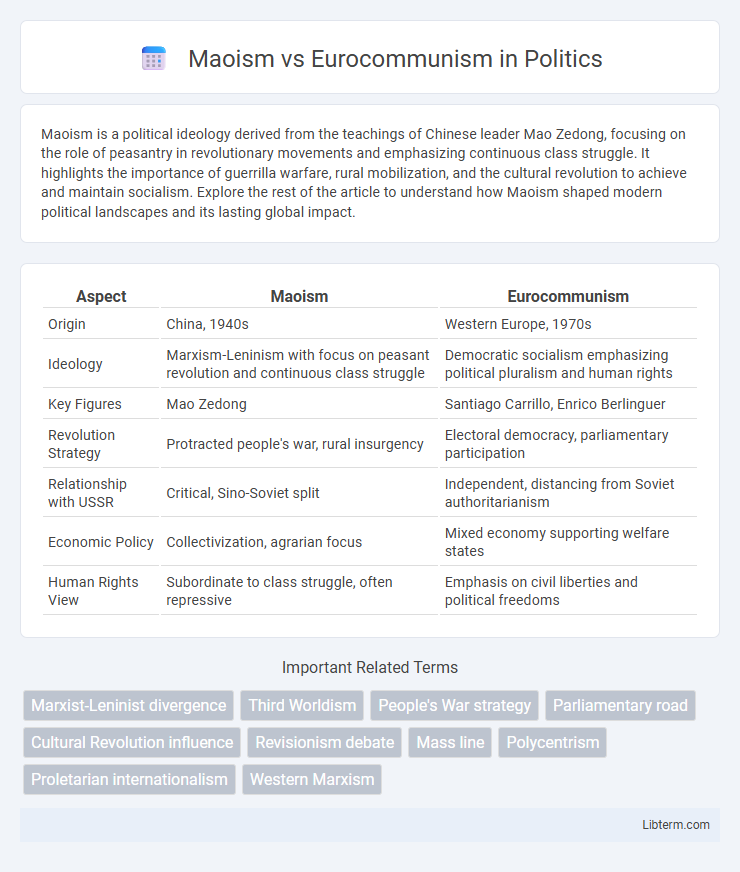Maoism is a political ideology derived from the teachings of Chinese leader Mao Zedong, focusing on the role of peasantry in revolutionary movements and emphasizing continuous class struggle. It highlights the importance of guerrilla warfare, rural mobilization, and the cultural revolution to achieve and maintain socialism. Explore the rest of the article to understand how Maoism shaped modern political landscapes and its lasting global impact.
Table of Comparison
| Aspect | Maoism | Eurocommunism |
|---|---|---|
| Origin | China, 1940s | Western Europe, 1970s |
| Ideology | Marxism-Leninism with focus on peasant revolution and continuous class struggle | Democratic socialism emphasizing political pluralism and human rights |
| Key Figures | Mao Zedong | Santiago Carrillo, Enrico Berlinguer |
| Revolution Strategy | Protracted people's war, rural insurgency | Electoral democracy, parliamentary participation |
| Relationship with USSR | Critical, Sino-Soviet split | Independent, distancing from Soviet authoritarianism |
| Economic Policy | Collectivization, agrarian focus | Mixed economy supporting welfare states |
| Human Rights View | Subordinate to class struggle, often repressive | Emphasis on civil liberties and political freedoms |
Origins and Historical Background
Maoism originated from the Chinese Communist Party under Mao Zedong, emphasizing agrarian revolution and peasant-based insurgency inspired by China's 20th-century anti-imperialist struggles. Eurocommunism emerged in the 1970s among Western European communist parties, such as Italy's PCI and Spain's PCE, seeking to distance themselves from Soviet authoritarianism and promote a democratic, parliamentary path to socialism. The historical context of Maoism centers on anti-colonial national liberation, while Eurocommunism reflects Cold War-era Western Europe's adaptation to pluralistic political systems and human rights discourse.
Core Ideological Differences
Maoism emphasizes agrarian-based revolution, protracted guerrilla warfare, and continuous cultural revolution to achieve and maintain proletarian dictatorship, rooted in Marxism-Leninism with a focus on the peasantry as the revolutionary vanguard. Eurocommunism, emerging in Western Europe during the 1970s, advocates for democratic socialism through parliamentary means, rejecting violent revolution and aligning with pluralist and humanist values within a capitalist framework. Core ideological differences lie in Maoism's reliance on rural insurgency and ideological purity versus Eurocommunism's pragmatic engagement with democratic institutions and commitment to political pluralism.
Key Theoretical Influences
Maoism drew heavily from Marxism-Leninism, emphasizing the importance of peasant-based revolutionary struggle and continuous class struggle under socialism, as outlined by Mao Zedong in works like "On Contradiction." Eurocommunism emerged in the 1970s within Western European communist parties, influenced by a revisionist Marxist perspective that prioritized democratic socialism, political pluralism, and autonomy from Soviet orthodoxy. These theoretical divergences reflected contrasting approaches to revolution, party structure, and the role of the proletariat versus broader social forces.
Approach to Revolution and Change
Maoism emphasizes a protracted people's war led by the peasantry as the primary revolutionary force, advocating for continuous class struggle even after seizing power to prevent capitalist restoration. Eurocommunism, by contrast, supports achieving socialism through parliamentary democracy and reforms within existing political structures, rejecting armed insurrection. These divergent approaches reflect Maoism's focus on radical, rural-based revolution versus Eurocommunism's commitment to peaceful, legalistic change.
Attitude toward the Soviet Union
Maoism emerged as a radical critique of Soviet revisionism, emphasizing continuous revolution and opposing Soviet-style bureaucratic socialism. Eurocommunism, by contrast, sought to distance itself from Soviet influence, advocating a democratic path to socialism within Western parliamentary systems. Both ideologies rejected the USSR's dominant role but differed fundamentally in strategies and interpretations of communist doctrine.
Role of the Working Class and Peasantry
Maoism emphasizes the revolutionary role of the peasantry as a primary force in overthrowing feudal and capitalist structures, viewing the working class as an urban minority needing alliance with rural peasants. Eurocommunism, by contrast, prioritizes the industrial working class as the main agent of socialist transformation within democratic frameworks, often downplaying the revolutionary potential of the peasantry in advanced capitalist societies. This divergence reflects Maoism's focus on agrarian revolution in semi-feudal contexts versus Eurocommunism's adaptation to Western Europe's industrial capitalist environment.
Strategies for Political Power
Maoism emphasizes revolutionary rural peasant mobilization and protracted people's war as core strategies for seizing political power, contrasting sharply with Eurocommunism's commitment to democratic processes and parliamentary participation. Eurocommunists advocate for working within existing democratic frameworks to achieve socialism through electoral means and coalition-building. Maoism's approach prioritizes armed struggle and cultural revolution to dismantle existing state structures, whereas Eurocommunism rejects violent overthrow, focusing instead on gradual reform and legal political engagement.
Leadership and Organizational Structure
Maoism emphasizes a centralized leadership with a strong emphasis on the role of the Communist Party's vanguard and mass mobilization through grassroots revolutionary committees, reflecting a hierarchical but participatory structure. Eurocommunism advocates for a more pluralistic and democratic leadership model with decentralized organizational structures, aiming to integrate communist parties within parliamentary systems and broader social movements. The contrasting approaches highlight Maoism's top-down command and ideological discipline versus Eurocommunism's flexibility and adaptation to Western democratic frameworks.
Impact on Global Communist Movements
Maoism fundamentally reshaped global communist movements by emphasizing peasant-led revolution and protracted guerrilla warfare, inspiring insurgencies in countries such as Nepal, India, and the Philippines. Eurocommunism, emerging from Western European communist parties, promoted democratic socialism and political pluralism, influencing leftist movements to pursue reform within parliamentary systems rather than armed struggle. These divergent approaches created ideological divides that shaped international communist strategies and alliances throughout the Cold War era.
Contemporary Relevance and Legacy
Maoism continues to influence insurgent movements and radical leftist groups, emphasizing agrarian revolution and protracted people's war in contemporary geopolitics, particularly in parts of Asia and Latin America. Eurocommunism, which emerged as a reformist movement seeking democratic socialism within a parliamentary framework, shaped European leftist policies by promoting pluralism and distancing from Soviet orthodoxy during the Cold War, leaving a legacy in progressive governance models. The enduring relevance of both ideologies lies in their impact on contemporary political discourse regarding revolutionary strategy, democracy, and socialist praxis in diverse global contexts.
Maoism Infographic

 libterm.com
libterm.com